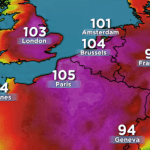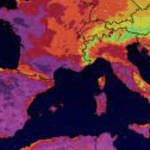Concerns about the ongoing effects of the climate catastrophe on Morocco were raised on Thursday, when the health ministry reported that a heatwave in the country’s capital city of Beni Mellal had killed at least 21 people in a 24-hour period.
The meteorology department said soaring temperatures affected much of the North African country from Monday 22 to Wednesday 24 July, reaching 48°C in some areas.
In Beni Mellal, “the majority of deaths involved people suffering from chronic illnesses and the elderly, with high temperatures contributing to the deterioration of their health conditions,” the regional health directorate said in a statement.
Beni Mellal, more than 200km southeast of Casablanca, was still experiencing temperatures of 43 degrees on 25 July.
Temperatures are expected to drop in the coming days, the meteorology department said.
Morocco has suffered a sixth consecutive year of drought, and record heat this past winter with January the hottest since 1940, according to the meteorology department which had recorded temperatures approaching 37°C in some places.
The rising temperatures and prolonged drought, which have lowered reservoir levels, are a threat to the vital farm sector.
Water evaporation reached 1.5 million cubic metres (53 million cubic feet) per day, water minister Nizar Baraka said at the end of June.
The High Commission for Planning said in May that the “labour market continues to suffer from the effects of the drought” and reported that the unemployment rate had increased to 13.7% in the first quarter, up from 12.9% in the same period of last year.
According to the data, almost 159,000 employment in the agriculture industry vanished.
The record high for Morocco during a heatwave, 50.4°C, was reached in August of last year in Agadir, a coastal resort.
Globally speaking, July 22 was the hottest day since observations started in 1940, according to the EU’s Copernicus Earth observation program.
Climate change was earlier projected to cause the earth to experience an exceptionally lengthy period of severe heat and to break daily records this summer in the northern hemisphere.














